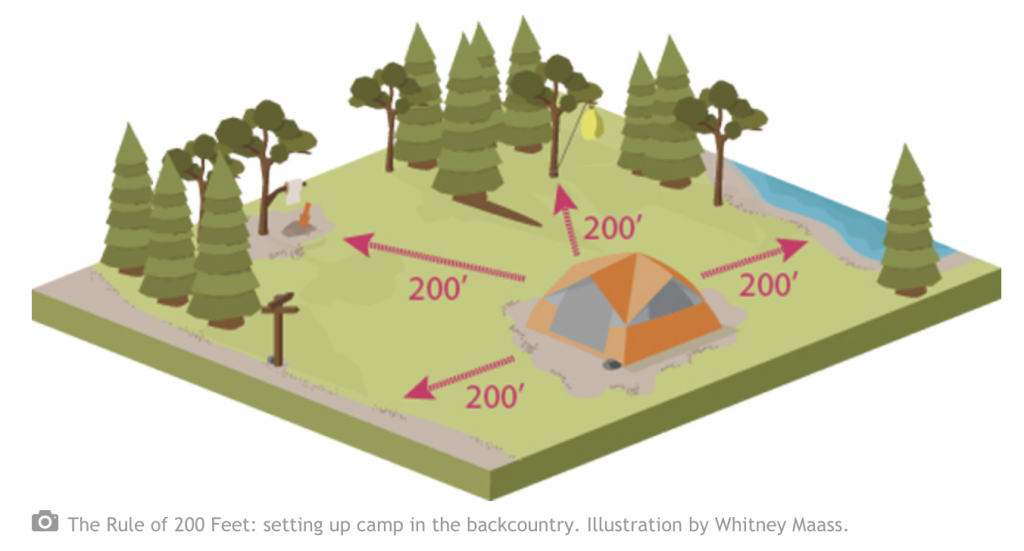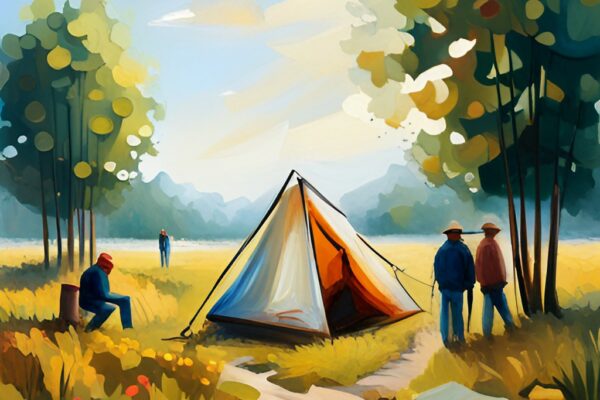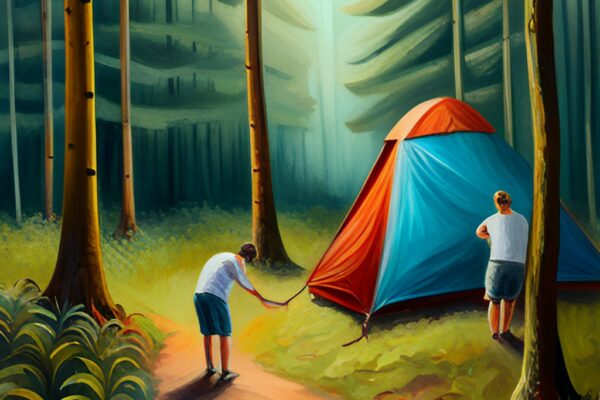If you are reading this, you’re probably planning for a camping trip. But preparing for the outdoors can be intimidating as it is exciting. One totally legitimate question to ask is: Am I safe from bears when I sleep in a tent? Can they eat me alive when I’m at my most vulnerable during my sleep? Sounds dramatic, I know, but I’ve actually wondered about that when I first started.
Now, after camping for a few years and spending 20+ hours online obsessively learning about bear behavior and attacks, I can confidently say that:
Tents are not safe from bears without the necessary precautions. Bears can easily rip through your tent. You need to take some critical steps to ensure bears stay away from your tent and campsite. Fortunately, fatalities from bear attacks are extremely rare.
So keep reading if you want to know why a bear would bother you in a tent, how likely you are to be attacked, and how to protect yourself best.
Why Bears Come Close to Your Tent
Food! Not that surprising, right? You’ve probably already guessed it. After all, there’s no way a bear would simply pay you a friendly visit.
But bears rarely prey on humans. They would be looking for our food and food wastes. Believe it or not, they can actually smell food up to 20 miles away and come to your campsite to get it. According to research from this wildlife park, bears are drawn to all of the following:
- All human food
- Pet food and livestock feed
- Garbage
- Cooking pots and utensils
- Cooking oils
- Fuel for stoves and lanterns
- Unopened canned beverages
- Cosmetics, insect repellents, lotions, toothpaste
- Birdseed and hummingbird feeders
Here’s a live video of a grizzly bear stealing food right outside a tent:
Will Your Tent Protect You in a Bear Attack?
Your tent will offer essentially no protection in case of a bear attack. Your tent is made of thin fabrics like nylon or polyester, similar to materials used in backpacks.
But a bear can take on a pack of wolves by itself and rip off the head of a moose. So there’s no doubt they can tear through tent fabrics with those sharp claws.
That being said, thick canvas tents with steel poles may offer some degree of protection. They are generally sturdier and require more effort to tear through. But they are quite rare these days as camping tents, and a determined bear can still damage them.
In short, your tent is not safe from bears.
How Often Do People Get Attacked?
While the passages above may sound scary, a bear attack is extremely rare. From Wikipedia, I counted 134 fatal attacks from black and brown bears since the 1950s. This amounts to an average of 2 fatal attacks per year. That’s a tiny number compared to the 42 million total number of campers in 2019, according to Statista.
To give you more perspective, you are more likely to be killed by a wasp or hit by lightning than killed by a bear.
You might think these numbers are quite low, given how frequent bear encounters are. In fact, I’ve seen bears myself when camping in Lake Tahoe and Yosemite.
But keep in mind that only a tiny percentage of those encounters lead to attacks. Much more often, it’ll be a peaceful encounter. Even if the bear chooses to attack, it’s much more likely to be a defensive attack than a predatory attack. A bear would leave you alone after a defensive attack rather than mauling you. It’s just scared rather than trying to eat you.
Video below shows a startled bear defensively attacking a mountain biker (starting at 30 seconds)
A predatory attack is much rarer but much more dangerous. These will only happen when a bear is desperate for food.
Where do bear attacks happen the most often?
According to the map based on the data from data.world and Wikipedia, most fatal bear attacks happen in Alaska and the Northwest regions. Camping in mountainous areas is also risky. Be sure to check with your campground (or the nearest one) to learn about the bear activity around your destination.
The type of camping you do also greatly impact how likely a bear will attack you. Since black bears are more likely to live in forests, you would be at a much higher risk if you were backpacking in remote locations than camping in developed campgrounds. The size of the crowds also plays a role here since bears are timid around large groups.
How to Bear-Proof Your Tent and Campsite
After talking about all the risks, let’s walk through what you can do to protect yourself and other campers. The key takeaway here is that prevention is the best protection. You want to avoid a visit from those furry giants in the first place.
Proper Food Storage
Since we said bears come for food, the best way to ensure your campsite doesn’t become a target is to minimize the smell from food and food wastes. Never leave any food, cooler, cooking supplies, utensils, or garbage out in the open and unattended. Store these away even when you are hanging out in your tent.
Many campgrounds offer food storage lockers on-site if bears are pretty active in surrounding areas. I was always required to use these when camping in Lake Tahoe.
If you are camping in the backcountry, things are a little trickier. There won’t be anything as secure as a food storage locker. The traditional solution has been to hang your food in a sack on tree branches so that it’s harder for bears to reach. This option is popular among lightweight backpackers since it only requires a rope, a sack, and a little effort. I’ve done this many times myself.
But many are skeptical of this method because, after all, can you really hang the bag higher than what bears can reach (at least 10ft high and 6ft away from the trunk)? What if you are camping above treeline? And I know from personal experience that my food would still get eaten at night by rodents and who knows what.
This leads to the alternative of a bear canister, a hard-sided food container that, when closed, prevents the scent of food from traveling. And though it’s quite heavy for backpacking at 2 – 3lbs, it’s required in many wilderness areas, and you can have the peace of mind that a bear won’t be roaming around your campsite. Even if bears do come by, they won’t be able to open the canister. It is also rodent-proof.
Bear-proof Your Tent
Hopefully, bears won’t smell food at your campsite after you’ve stored it properly. Now, to be extra safe, you want to make sure your tent is not “contaminated” with any food scent whatsoever. Here are some tips:
Set up your cooking site and food storage at least 200 feet from your tent.
I’ll admit that this is not feasible at most established campgrounds. That’s why there are bear lockers. But in the backcountry, this is essential. Cooking food produces the strongest aromas, so you’ll want to keep these as far away from your tent as possible. According to the Washington trails association, a safe distance would be around 200ft or 70 adult steps.
Why 200 ft, you may ask? The “200ft rule” is widely referenced in camping. It started when the Leave No Trace protocol recommended that people camp at least 200 feet away from any water to allow for wildlife access.
Over the years, campers have come to use 200 feet as a benchmark for all kinds of safety distances. It’s recommended that you set your tent 200ft away from trails, toiletries, water, and food storage. See the illustration below from WTA:

Avoid storing food or eating in your tent. This one should be self-explanatory. Putting food in your tent is one surefire way to let the bears smell it.
Try not to sleep with the clothes you cooked with so that you don’t carry the scent into your tent. It’s recommended that you bring separate clothes for sleeping.
What To Do If You Hear a Bear Outside Your Tent
After all that’s said above, what if a bear still shows up at your tent, and sounds like this (skip to 1:40):
Ok, I admit that’s probably an exaggeration. Most likely, the bear will be just walking silently around your tent. A couple of times, I woke up and found some bears’ footprints outside. I didn’t even realize they were there. But if you are completely conscious of a bear outside your tent and want it to go away, here are some things you can do:
Let the bear know you are present
This may sound crazy since your natural response would be to hide and be as quiet as possible. But simply making some noises in your tent can scary off the bear. Bears are actually wary of people, so they are more inclined to walk away than to confront you.
I also found this to be true based on my personal experience. Once, I was hiking in Yosemite and saw a bear cub ~10ft away at the same time it saw me. It ran away immediately and hid behind a tree. Moma bear didn’t come around either, and none of us were threatened. So most of the time, bears simply want nothing to do with us.
Do NOT try to run away. I can’t stress this enough. I know it’s counterintuitive, but running away can trigger a bear’s hunter instinct and make it see you as prey. That’s the last thing you want. And you’ll never be able to outrun a bear, so why try?
If the bear is still around after knowing you’re there, you should tell the bear to go away; yell at it and be aggressive if necessary. Open your tent as needed and make yourself big. Don’t believe it can be effective? Watch the video below:
But talking won’t work for nuisance bears. These are bears who got accustomed to getting food around campsites and aren’t afraid of humans anymore. This can happen at established campgrounds, and there’s really nothing you can do about it. You still shouldn’t befriend the bears, though, since they can turn on you at any moment and launch a fatal attack. These bears are usually reported to the rangers and, sadly, killed later on.
Bear Spray
It’s good to have your bear spray ready as soon as you know a bear is outside your tent.
Bear spray is not lethal but extremely irritating to the skin, eyes, and respiratory tracks of whoever/whatever inhales it. It’s highly effective at deterring bears if you spray it within a distance of 1.5 to 3 meters.
But a precaution is that you have to make sure the bear spray doesn’t get on when you are using it to defend against a bear. It’ll be very irritating and even damaging. This means you should never use your bear spray inside a tent or spray into a headwind. It’s gonna hurt.
If you do get bear spray onto your skin, eyes, or clothes, the nps recommends rinsing for 15 – 20 minutes.
Another option is to shoot the bear in case of an attack. I’ve personally never done this before, but make sure you learn how to use the gun before you go. You’re not going to figure it out when a bear is right in front of you.
The Bottom Line
You now know with certainty that tents are not safe from bears, but don’t let that deter you from camping. You should be safe as long as you store your food properly to minimize the smell, set up your tent at least 200 ft away from food storage spaces, and avoid carrying any smell into your tent. Bear attacks are also extremely rare.














